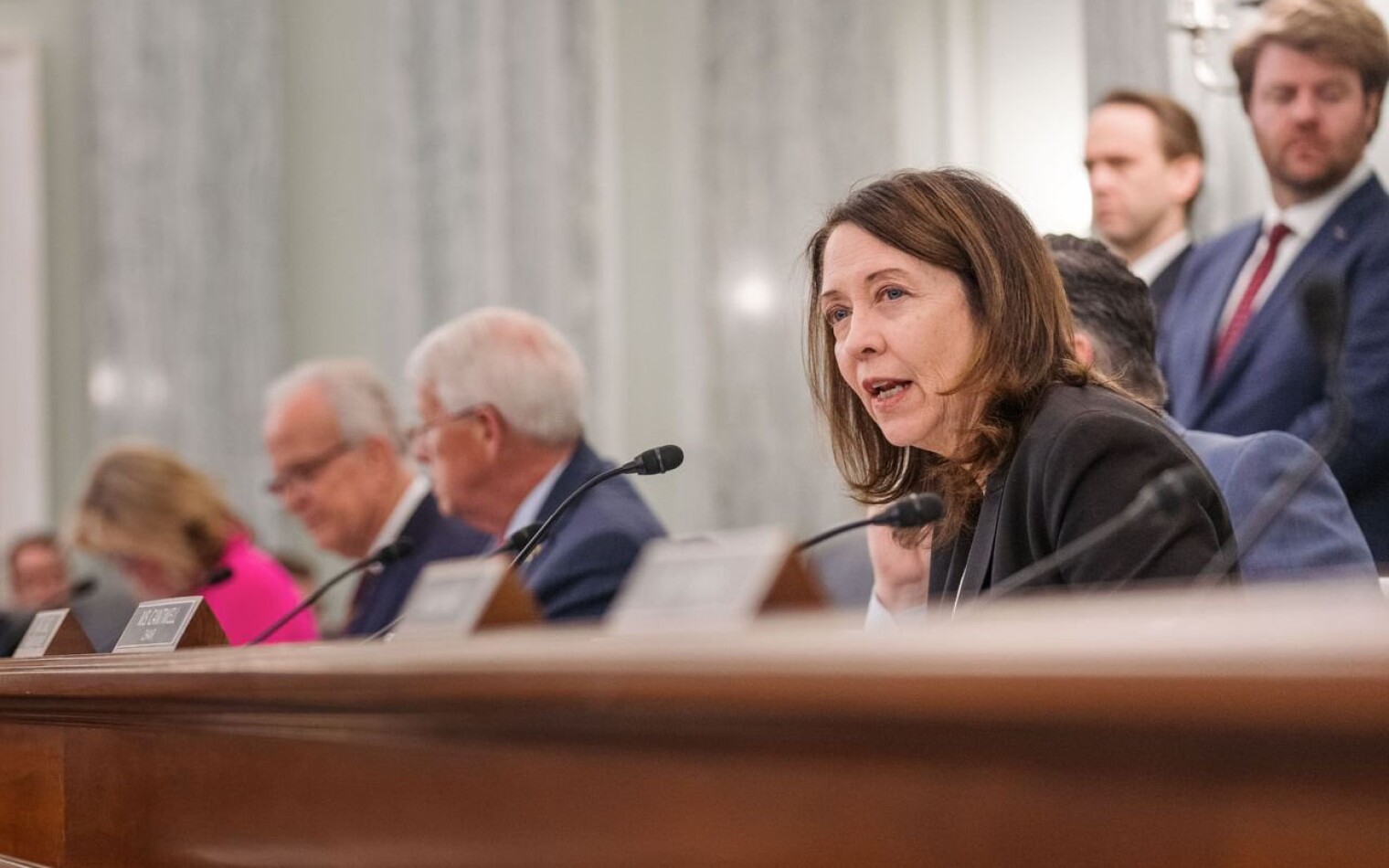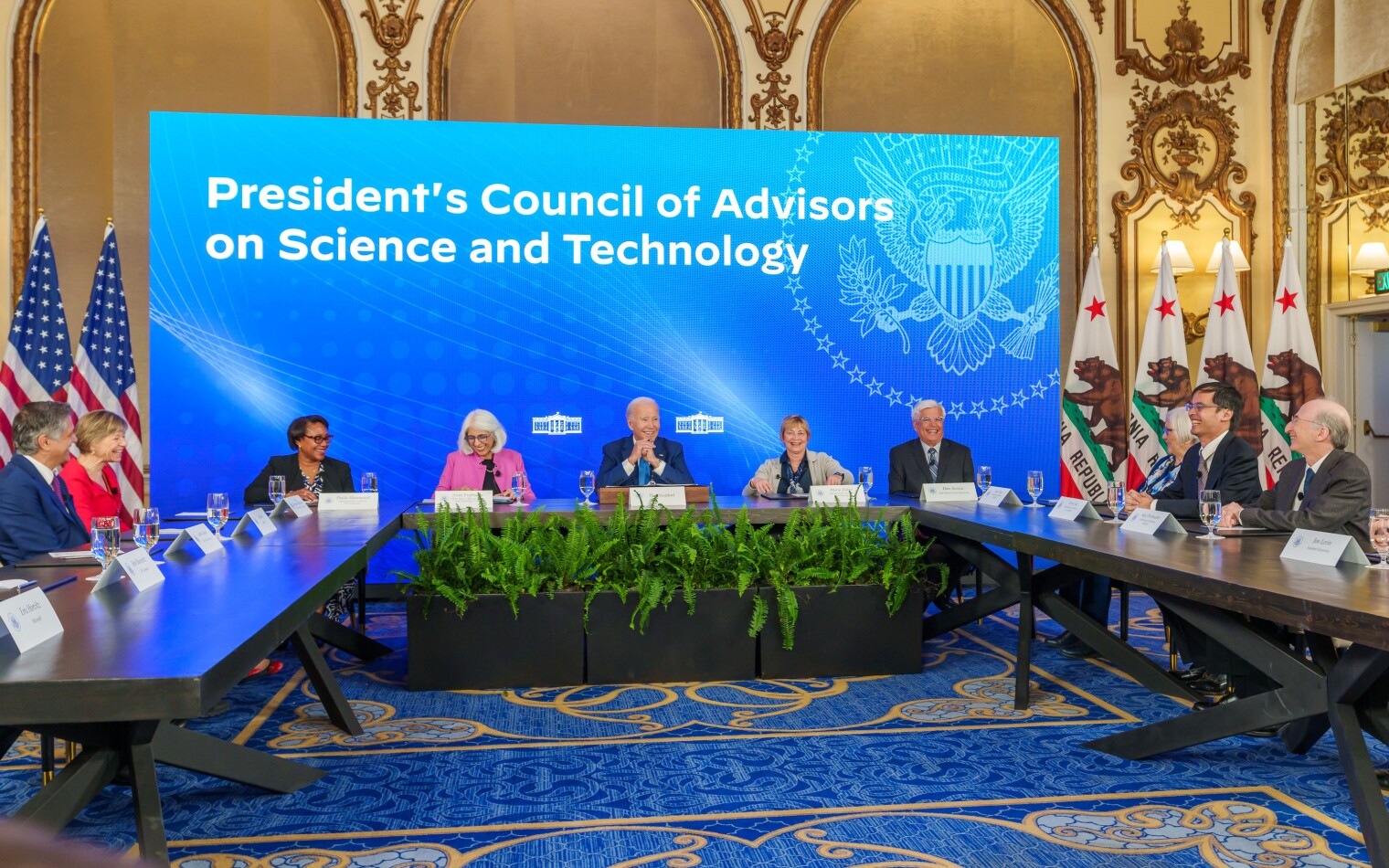| |
| FYI: Science Policy News from AIP |
| THIS WEEK |
|
|
|
|
|
|
| What’s Ahead |
 |
| Sen. Maria Cantwell (D-WA) speaks at a committee hearing. (Senate Commerce, Science, and Transportation Committee) |
Cantwell Proposes Funding Science with Spectrum Auctions
Sen. Maria Cantwell (D-WA), chair of the Senate Commerce, Science and Transportation Committee, introduced a bill last week that proposes using electromagnetic spectrum band auctions to raise billions of dollars for programs authorized by the CHIPS and Science Act, among other objectives. Called the Spectrum and National Security Act, Cantwell’s proposal would raise up to $3.3 billion for the National Science Foundation, $1.7 billion for the National Institute of Standards and Technology, and $2 billion for the Department of Commerce’s Regional Technology and Innovation Hubs program. It would also provide up to $3 billion to expand the department’s semiconductor manufacturing incentives program, which has been in heavy demand. Cantwell’s committee will vote on whether to advance the bill at a meeting on Wednesday. (Update: The committee removed the legislation from the agenda shortly before the meeting.)
Cantwell was a chief architect of the CHIPS and Science Act, which appropriated $52 billion for semiconductor initiatives but did not include any funding for other science and technology programs authorized in the act. Congress so far has not come close to meeting the funding targets set in the act, and so the spectrum auction funds would partially make up for that shortfall. Another aim of the bill is to improve federal spectrum management and coordination and reauthorize the FCC’s auction authority, which lapsed in March 2023. It would also guide spectrum innovation and R&D initiatives such as national testbeds for dynamic spectrum sharing.
NSF Board to Discuss Giant Telescopes, Merit Review, and AI
The National Science Foundation will provide details this week on the process it will use to decide whether to seek construction funding for the Thirty Meter Telescope or the Giant Magellan Telescope. NSF Director Sethuraman Panchanathan will describe the process during an open session of the National Science Board’s first quarterly meeting of 2024, occurring this Wednesday and Thursday. The board announced in February that it will limit NSF’s contribution to $1.6 billion and anticipated that the cap will require the agency to drop one of the telescopes from consideration.
Also at the meeting, the board’s Commission on Merit Review will present preliminary recommendations for updating the criteria NSF uses to assess grant applications. The commission’s review has focused on clarifying the “broader impacts” criterion that judges the potential of research projects to have societal benefits. In addition, the board will host a panel discussion titled “The Future is Now: Harnessing AI for Good” featuring Microsoft’s chief scientific officer and representatives from three research universities. This will be the last meeting for eight board members whose terms expire May 10. The meeting will be followed by NSF’s awards gala, at which the board will present its annual Science and Society and Vannevar Bush awards.
Fusion Facility Priorities Report Up for Review
The Fusion Energy Science Advisory Committee will meet Tuesday to discuss a draft report recommending priority facility projects for the Department of Energy to pursue over the next decade. The DOE Office of Science tasked each of its advisory committees with assessing the readiness and scientific significance of major construction projects in their respective disciplines. The office asked a FESAC subcommittee to review 10 projects: ITER, the Matter in Extreme Conditions upgrade to the LCLS X-ray laser, the Fusion Prototypic Neutron Source (FPNS), the eXcite tokamak, the Blanket Component Test Facility (BCTF), the High Heat Flux Test Facility, the Midscale Stellarator, the NSTX-U Liquid Metal/Core Edge Facility, the Fuel Cycle Test Facility (FCTF), and the Fusion Integration Research and Science Test Facility. The subcommittee added two items to the list: the Exhaust and Confinement Integration Tokamak Experiment and New Inertial Fusion Energy Concepts and Upgrades. It concludes that four of the facilities are “absolutely central” to contributing to world-leading science or closing fusion technology gaps within the next decade, listing them in alphabetical order: BCTF, FCTF, FPNS, and ITER. The remaining facilities are described as “important and well-deserving” of DOE support. The subcommittee notes it did not attempt to rank order any of the facilities beyond the two groupings. At the meeting, FESAC will also hear from a separate subcommittee that will recommend what FES programs should be prioritized to support the goal of deploying a pilot fusion power plant.
More Events in the Week Ahead
- The House will vote on legislation that would update policy for weather programs at the National Oceanic and Atmospheric Administration and a separate bill supporting NOAA’s work to understand interactions between wildfires and the weather. Refreshing NOAA’s weather research and forecasting programs is a major priority of Science Committee Chair Frank Lucas (R-OK). (Monday)
- NASA Administrator Bill Nelson will testify on the agency’s budget request for fiscal year 2025 before the House Science Committee. (Tuesday)
- Top Defense Department officials will discuss their science and technology priorities in the fiscal year 2025 budget request at a webinar. (Tuesday)
- The Defense Science Board will meet in closed session to discuss forthcoming reports on climate change and global security, commercial space, and digital engineering, among other topics. (Wed-Thu)
- A week of events highlighting fusion energy research in the U.S. begins next Monday. (May 6 to 10)
|
|
| In Case You Missed It |
 |
| President Joe Biden at a briefing on artificial intelligence from members of the President’s Council of Advisors on Science and Technology in September 2023. (Cameron Smith / The White House) |
PCAST Backs Use of AI to Accelerate Scientific Research
The President’s Council of Advisors on Science and Technology published a report on April 29 that explores how AI can accelerate scientific research and help tackle major societal challenges. The report emphasizes that AI should support, not replace, human scientists and contains a series of recommendations for federal research agencies, national labs, industry, and academia to develop AI tools and systems that are beneficial to research. PCAST unanimously approved the report’s publication at a meeting last week that previewed its recommendations.
The report recommends federal funding agencies encourage innovative approaches to integrating AI into scientific workflows and continue to support traditional human-led scientific research. It also proposes that agencies require researchers they fund to provide responsible AI use plans to assess AI-related risk in alignment with the White House’s AI Bill of Rights blueprint and the National Institute of Standards and Technology’s AI Risk Management Framework. Additionally, the report recommends Congress fully fund NSF’s National Artificial Intelligence Research Resource, highlighting its potential as a stepping stone for even more ambitious programs. PCAST also calls for expanding NSF’s National Secure Data Service Demonstration project and the Census Bureau’s Federal Statistical Research Data Centers to give federally funded researchers greater access to federal datasets.
NSF Awards $90 Million to STEM Education Platform
The National Science Foundation will spend $90 million over five years on SafeInsights, a STEM-education platform led by Rice University’s open access publishing nonprofit OpenStax, the agency announced last week. SafeInsights is described by NSF as a hub for research coordination that will leverage data across “a range of major digital learning platforms that currently serve tens of millions of US. learners across education levels.” The award is part of NSF’s Mid-scale Research Infrastructure-2 program, which funds major infrastructure projects costing between $20 million and $100 million. “There is an urgent need for research-informed strategies capable of transforming educational systems, empowering our nation’s workforce, and propelling discoveries in the science of learning,” said NSF Director Sethuraman Panchanathan in a press release about the award.
Mars Science Strategy Study Launches
The National Academies held an event last week to mark the kickoff of a study titled “A Science Strategy for the Human Exploration of Mars,” which will be led by planetary scientist Linda Elkins-Tanton and spacesuit engineer Dava Newman. NASA commissioned the study to help identify the highest priority science objectives of crewed missions to Mars and spool out the decisions that need to be made to design a successful mission architecture. At the kickoff event, representatives from various NASA research institutes presented their perspectives on matters such as the science priorities of various decadal surveys and NASA’s work to date in planning for crewed Mars missions.
|
|
| Upcoming Events |
All events are Eastern Time, unless otherwise noted. Listings do not imply endorsement. Events beyond this week are listed on our website.
Monday, April 29
Tuesday, April 30
Wednesday, May 1
Thursday, May 2
Friday, May 3
No events.
Monday, May 6
Know of an upcoming science policy event either inside or outside the Beltway? Email us at fyi@aip.org.
|
|
| Opportunities |
|
Deadlines indicated in parentheses. Newly added opportunities are marked with a diamond.
Job Openings
Solicitations
Know of an opportunity for scientists to engage in science policy? Email us at fyi@aip.org.
|
|
| Around the Web |
|
News and views currently in circulation. Links do not imply endorsement.
White House
Congress
Education and Workforce
Research Management
Labs and Facilities
Computing and Communications
Space
Weather, Climate, and Environment
Energy
Defense
Biomedical
International Affairs
|
|
|
| |
| This message is sent to you because you signed up for one of our newsletters. To manage your AIP email preferences and newsletter subscriptions ( add or remove ), please click here. Or to automatically unsubscribe from all AIP emails, click here. As a 501(c)(3) non-profit, AIP is a federation that advances the success of our Member Societies and an institute that engages in research and analysis to empower positive change in the physical sciences. The mission of AIP (American Institute of Physics) is to advance, promote, and serve the physical sciences for the benefit of humanity. |
|
| © 2025 American Institute of Physics. |
AIP, 1 Physics Ellipse, College Park MD 20740-3841
301.209.3100 - newsletters@aipcomm.org |
|
|